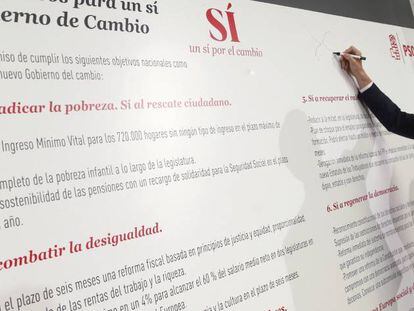Negotiating Catalonia
The Socialists’ idea for a new deal is a positive way to kickstart the territorial debate

Any idea is welcome if it helps the election campaign unblock our festering problems – or at the very least address them more reasonably. Such is the case with the new proposal by the Socialist Party (PSOE) regarding the Catalan question. The future of the region apparently ranks first among Spain’s political problems, yet it has only been present implicitly in the public debate since the general elections of December 20.
The proposal involves reaching “a political pact with Catalonia” that will “acknowledge its singularity and improve its self-government.” The idea connects with, and develops, the party’s earlier concept of structuring Spain along federal lines, but that would require constitutional reform to become a reality. It would also require all Spaniards, and not just Catalans, to support such an agreement. At the same time, Catalonia would be granted the role of a leading player while “respecting the implications of the principle of equality.”
It is evident that Catalonia is a national community with a singular and very pronounced personality at the linguistic, cultura, economic, historic and political levels
All of this fits in with the PSOE’s 2013 Granada Declaration, although its actual embodiment in a “political pact” would require nuances depending on whether it is being interpreted by this or that regional leader. And that seems to be the point of the proposal.
The lack of details regarding the content of this pact allows several things to happen at the same time. Not the least of these is the opening of an in-depth debate over Catalonia’s place in Spain – a debate that was absent from the previous campaign. This, in turn, opens the door to potential post-election agreements. In such an event, the usefulness of the pact would extend beyond Socialist circles.
At the same time, the initiative allows the Socialist family to underscore the multilateral nature of Spain’s system of Autonomous Communities and to highlight the bilateral relations that already exist with several regions in the fields of finance (the Basque concierto granting tax collection powers), the judiciary (insularity), and law enforcement (the Basque and Catalan Ertzaintza and Mossos d’Esquadra police forces respectively).
Catalonia is granted the role of a leading player while “respecting the implications of the principle of equality”
The Socialist proposal strays from today’s prevailing views that the best way to deal with the Catalan issue is either to be passive, which only worsens the problem; or else, at the opposite extreme, to organize an independence referendum that would aggravate the tensions and divisions within Catalan society rather than resolving the matter through a negotiated improvement of Catalonia’s place in Spain.
Furthermore, the proposal promises to respect “the implications of the principle of equality.” Equality implies treating equally those who are equal: that is to say, granting the same basic social rights to all citizens regardless of their origin or place of residence. But it also means treating those who are different differently, and it is evident that Catalonia is a national community with a singular and very pronounced personality at the linguistic, cultural, economic, historic and political levels.
Sign up for our newsletter
EL PAÍS English Edition has launched a weekly newsletter. Sign up today to receive a selection of our best stories in your inbox every Saturday morning. For full details about how to subscribe, click here.
If we consider the fact that the Catalan assembly on Tuesday began seeing one of the “disconnect laws” aimed at severing ties with the Spanish state, in this case one dealing with welfare, the Socialist Party's ideas are even more interesting. On paper, this bill does not appear to be unconstitutional because it only deals with non-contributory pensions that already fall under the Catalan government’s powers. But its origins lie in the pro-sovereignty declaration of November 9 that was later annulled by Spain’s Constitutional Court.
In short, these proposals are a pertinent reminder that the Catalan question requires a political solution, which is the only way to cut the Gordian knot of its mounting legal complexity.
English version by Susana Urra.












































